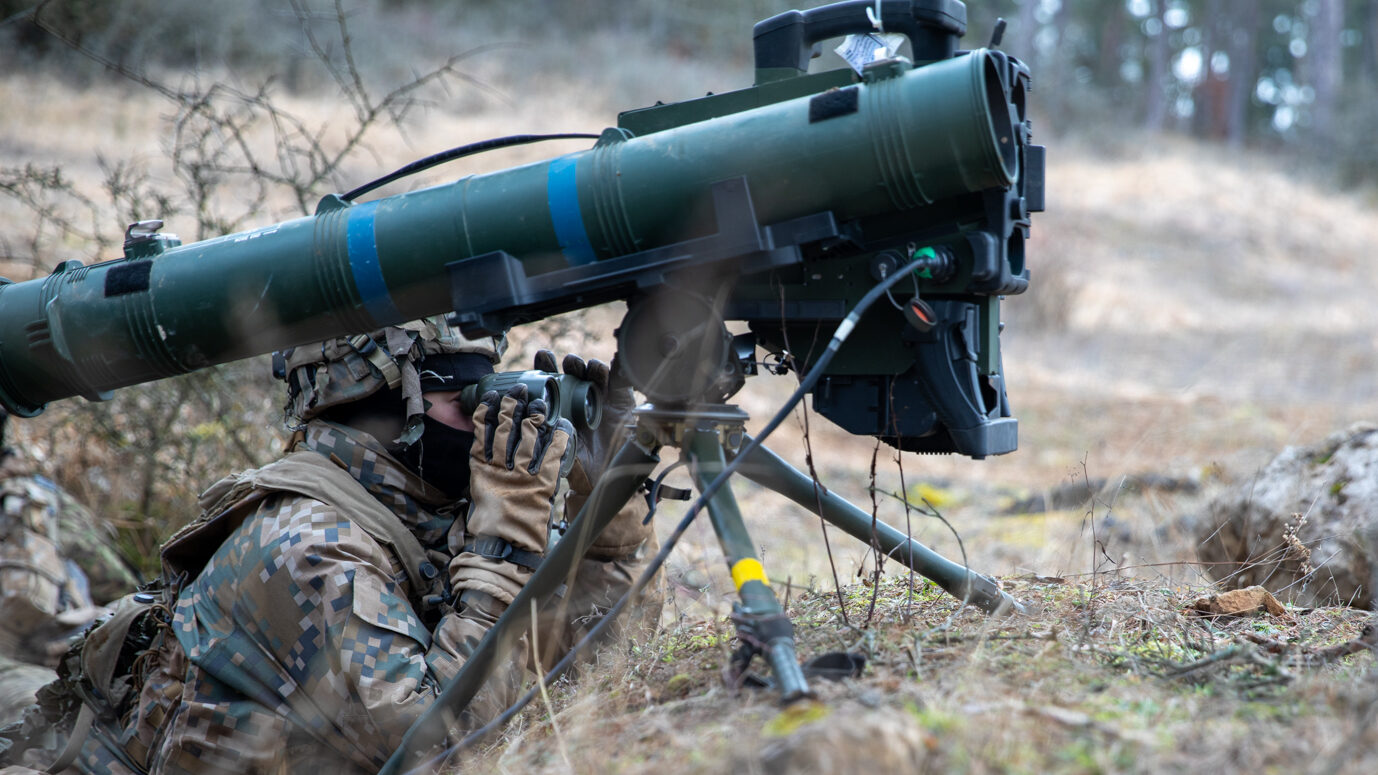
A Latvian Armed Forces Soldier, assigned to the Combat Support Battalion, prepares a defensive position armed with a Spike anti-tank weapon during training exercise Allied Spirit at Hohenfels, Germany, on January 27, 2022.
(U.S. Army photo by Sgt. Rene Rosas)
In an effort to boost the US economy, President Joe Biden has pushed a broad “Buy American” agenda. But AEI’s Bill Greenwalt and Dustin Walker argue in the op-ed below that the White House is pushing away the defense industrial base of friendly nations, threatening to harm not only America’s relationships abroad at a crucial time, but its own military readiness.
The arsenal of democracy is making a comeback. As it did in past moments of global crisis, the United States is arming a sovereign nation in its struggle for survival against the depredations of a dictator. But it is not doing so alone.
In the aftermath of Russia’s invasion of Ukraine, the US is coordinating with its allies and partners on the urgent production, modification, donation and delivery of military equipment from across the world to Ukraine. It is working to rapidly replace equipment donated from its own inventory as well as those of its allies and partners. As many European nations consider increasing defense spending in future years, the US is helping lead discussions on how best to bolster capabilities needed to deter and defend against Russian aggression. And it is attempting to glean lessons from the war in Ukraine to prepare itself, as well as allies and partners such as Taiwan, for the possibility of Chinese aggression. This new arsenal of democracy is a multinational effort.
Yet at a decisive moment in the war in Ukraine when defense industrial cooperation with America’s allies and partners has never been more vital, the Biden administration is moving in the opposite direction. The so-called “Buy American” regulations will harm relationships with America’s friends, risk American jobs and leave America’s military less prepared for the challenges posed by Russia and China.
With certain exceptions, the Buy American Act requires the federal government to buy domestic “articles, materials, and supplies,” when they are acquired for public use. In March, one week after Russia invaded Ukraine, the Biden administration finalized a new regulation requiring that 75% of the cost of products procured by the US government be made up of domestic components by 2029. That’s up from the 55% today.
In other words, despite its rhetoric, the Biden administration is cutting back defense industrial cooperation with allies and partners in the middle of a war in Europe. The concern is so great that allied nations have written a new letter [PDF] to the White House, pleading for more critical exemptions.
The primary impact of this new regulation will be on defense. While the Buy American Act theoretically applies to all federal government purchases, in practice it most directly affects defense purchases, which do not receive the same broad exemptions as commercial goods do under World Trade Organization agreements and US free trade agreements such as the United States-Canada-Mexico Agreement (USMCA).
The Biden administration and proponents of so-called “Buy American” regulations claim they will help grow America’s defense industrial base and create more defense jobs. They will do neither. The Biden administration’s new regulation will aggravate relations with allies and partners and, over the long term, shrink the global market for US defense products.
Allies Call For Help
Last year, a group of military attaches representing 25 nations including the United Kingdom, France, and Germany wrote to lawmakers opposing an increased domestic content threshold under the Buy American Act. The Biden administration didn’t listen. As a result, just as many European nations are pledging significant annual increases in defense spending, Europe’s protectionists will need only parrot the Biden administration to argue that new resources should be spent to buy European products — not American products.
If Washington doesn’t “buy allied,” why should London, Paris, or Berlin “buy American”? For that matter, why should Seoul or Tokyo?
Supporters of so-called “Buy American” regulations point out that some allies and partners have negotiated Reciprocal Defense Procurement (RDP) agreements, which provide some exemption from the Buy American Act. However, 10 NATO states do not have these agreements. Nor do key Indo-Pacific allies and partners such as South Korea, Taiwan, India and Singapore. For those that do, the impact of these agreements is limited. RDP agreements do not guarantee allied participation in US defense programs. The opportunity to do so is often stymied by an intricate web of laws and regulations, as well as by a cultural hubris that finds it hard to admit that allied technology could ever be any good.
Still, even what constrained value these agreements do provide is at risk. Congressional supporters of so-called “Buy American” policies have passed multiple bills, including the recent bipartisan infrastructure law, pushing the last two administrations to limit the application of RDP agreements and reduce waivers and exemptions. In an April 25 letter to OMB, the same group of allies that opposed the higher domestic content threshold in the first place are now pleading with the administration to preserve an “allied” exemption.
Will the Biden administration ignore allies and partners yet again?
‘Buy American’ Makes It Harder To Do Business
Beyond the risk to American jobs, so-called “Buy American” regulations will endanger national security by making it harder for the US military to access the capability and capacity it needs to stay ahead of Russia and China.
These regulations will shrink the number of defense suppliers willing to do business with the Pentagon, both at home and abroad, potentially choking off the US military’s access to critical technology. In order to prove they are meeting the Biden administration’s higher domestic content threshold, companies will be required to produce complex and expensive compliance documentation to the government. For those US companies that sell exclusively or primarily to the government, they will have no choice but to shoulder this enormous paperwork burden while passing the cost of compliance on to taxpayers.
But many other companies have a choice of whether to do business with the government, which is not their only or even primary customer. That’s especially true of innovative companies leading the way in emerging technologies in the commercial sector—technologies our warfighters need to stay ahead of Russia and China. These American companies may very well conclude that complying with so-called “Buy American regulations—not only through administrivia, but potentially by changing the content of their products—just isn’t worth the hassle.
America’s warfighters deserve the best technology in the world, some of which happens to come from allies and partners like the United Kingdom and Australia. Placing arbitrary limits on the US military’s ability to access that technology makes it less likely allies and partners will be willing to sell it to us in the first place.
Allies and partners also help reduce the cost of defense procurement for US taxpayers through purchases of US military equipment and co-funding of the development of certain weapons systems. But the Biden administration’s protectionist regulations will increase costs for taxpayers by reducing incentives for US allies and partners to buy US defense equipment, particularly countries with substantial defense industries of their own.
The US defense industrial base is currently too small to produce enough military equipment to meet the US military’s needs, particularly when it comes to ships and critical munitions. For example, it will take years to replace US Javelins and Stingers supplied to Ukraine. Allies and partners can help plug this gap, which is especially dangerous in light of China’s vast and growing defense production capacity.
How Biden Can Help The US Defense Industrial Base
To be clear, the Pentagon can and should buy American—not because of any statute or regulation, but for the very simple reason that most of the best technology in the world that our warfighters need is made in America. Moreover, the Biden administration and the Congress can and must do more to support the US defense industrial base.
In particular, it’s time to invest in growing the defense industrial base to meet the needs of the US military as well as those of its allies and partners. Legislation proposed by Sen. Roger Wicker, R-Miss., to provide $25 billion to modernize and expand America’s public and private shipyards is a good start. Similar legislation will likely be needed for munitions production not only to replace munitions sent to Ukraine but to ensure sufficient munitions stocks for the Indo-Pacific.
Finally, instead of making it harder to work with allies, the Biden administration could focus on eliminating our adversaries from our defense supply chain. China, for example, sells commercial dual use component parts that often find their way into US military systems and will not be restricted under the new Biden “Buy American” thresholds. These Chinese semiconductors, electronics, IT services and telecommunications—even in small amounts—are rightful targets of regulatory scrutiny and should be replaced through a targeted “buy allied” strategy.
War unearths the past and reveals the future. The war in Ukraine is a reminder of the defense industrial base America once had and must build again—one with the scale, speed, responsiveness and flexibility that enables America and its allies and partners to deter and defend against great power adversaries willing to wage war to achieve political objectives.
China and Russia are no match for the combined technological and industrial might of the United States and its allies and partners. But we cannot marshal that collective power by indulging saccharine, populist schemes. Only in concert with allies and partners can America realize aspirations for a 21st century arsenal of democracy.
Bill Greenwalt, long the top Republican acquisition policy expert on the SASC, rose to become deputy defense undersecretary for industrial policy. A member of the Breaking Defense Board of Contributors, he’s now a fellow at the American Enterprise Institute. Dustin Walker is a non-Resident Fellow at the American Enterprise Institute and a former professional staff member on the Senate Armed Services Committee.
Sullivan says Ukraine supplemental should cover all of 2024, long-range ATACMS now in Ukraine
“We now have a significant number of ATACMS coming off their production line and entering US stocks,” Jake Sullivan said today. “And as a result, we can move forward with providing the ATACMS while also sustaining the readiness of the US armed forces.”


























